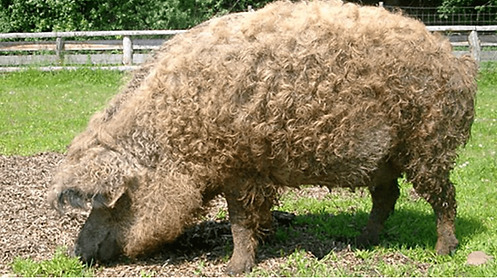#duroc
Explore tagged Tumblr posts
Text
So a lot of new shit dropped in the latest Minecraft update but obviously I only care about the pigs. Let's discuss breeds!

Starting off with the original pig just because— this little guy's probably a Landrace pig!

They're some of the most standard domestic pigs out there along with Yorkshires, but Yorkshires have perkier ears. Landrace pig ears lay flat much more similarly to our Minecraft pigs!

Next we have the warm pigs. These babies are probably Durocs!

Look how red and beautiful they are! There aren't many common red pigs, so it was really between these guys and Tamworths. Tamworths are an Irish breed, so they don't come from a particularly hot climate. Durocs however originated from Africa from what I researched!

And finally we have the cold pigs. These guys are most definitely Mangalicas!

These guys are like. One of the most prominent breeds with thick creamy hair to keep them warm. They're also Hungarian! They're also my favorite pig breed!!!!!
Hope you learned something new about pigs ^ - ^
#i love pigs so much. unzips my hoodie to reveal a T-shirt that reads “ask me about my pig fun facts”#Minecraft#Minecraft pigs#Minecraft update#minecraft snapshot#Minecraft snapshot 25w05a#pigs#pig breeds#mangalica#duroc#landrace#words
6K notes
·
View notes
Text






Clothes from Prada Fall-Winter 2012 Menswear Show
203 notes
·
View notes
Text










Napo cards: 🃏
#napoleonic era#napoleon bonaparte#playing cards#king of rome#Josephine#Bertrand#Hortense#joachim murat#marie walewska#marshal lannes#duroc#junot#ney
100 notes
·
View notes
Text

masquerade
283 notes
·
View notes
Text

#napoleonic era#napoleonic wars#geraud christophe michel duroc#duroc#artists on tumblr#traditional art#napoleon
75 notes
·
View notes
Text

i couldn't tell if durocs eyes were brown or blue so i took the dovewing approach and made them both doodled this like a week ago n colored it just now to get it out of the way eww ew ew ugglllayyyy take it go go leave me alone a man only knows one pose and its disgusting me omw to ☝ !!!!!!!
47 notes
·
View notes
Text
So Roustam wasn’t told about the 18 Brumaire thing ahead of time. He was told that Napoleon and Duroc “went on a walk” in Paris and then randomly both got murdered 😭😭 Apparently Josephine even pretended(?) to pass out on the sofa. So Roustam gets told this and he starts sobbing and everyone else was really upset because they all thought Napoleon and Duroc were dead. Then later he sees Napoleon randomly show up on a horse and he’s still alive. So everyone who had been crying then starts celebrating like hooray you’re not dead… lmaooo
#this is from Roustam’s memoir btw#I’m crying 😂#i kind of love Josephine very dramatically pulling off this whole scheme#Roustam Raza#Roustam#napoleon#napoleon bonaparte#Josephine#Duroc#napoleonic era#napoleonic#first french empire#french empire#napoleonic shenanigans#history#18th brumaire#18 brumaire#Brumaire
59 notes
·
View notes
Text



i'm reading Napoleon: Bisexual Emperor by Frank Richardson and although the book itself is a mess i do like the small amount of Napoleon/Duroc excerpts I found😭
#napoleon#napoleon bonaparte#napoleonic era#duroc#books#he loved Duroc so much *rolls in tears*#anyway the book is entertaining but so far uses a lot of sources based on people's memoirs#at least i only paid $10 bucks#naps was the king of the bisexuals so i don't need much convincing he could possibly be bi /shrug#personal rambles
58 notes
·
View notes
Text
Index: posts related to Duroc
(Includes interesting links and reblogs from people much better informed than me!)
Duroc in correspondence
Eugène to Hortense, 7 June 1800 (about Duroc almost drowning)
Duroc to Davout, April 1804 (reblog from handfuloftime)
Duroc to Eugène, 1st January 1806
Duroc to Eugène, 16 August 1805 (brief quote about Bessières)
Duroc to Murat, 29 October 1806
Duroc to Eugène, 17 - 21 July 1808
Duroc to Murat, 15 February 1809
Duroc to Eugène, 26 April 1809 (about Eugène losing the battle of Sacile)
Parallel letters from Vienna, 27 and 28 July 1809 (Bessières and Eugène have dinner with Duroc)
Duroc to Lebrun, 4 April 1811
Duroc to two ladies, from Moscow 1812
Duroc as diplomat and in the army:
Rousing sleepy colleagues (from Eugène's memoirs in Egypt)
Premier aide de camp?
Duroc in Berlin
Duroc in Berlin again (1803, reblog from handfuloftime, de Ségur's memoirs)
Duroc trying to appease Caulaincourt at the beginning of the Russian campaign (reblog from handfuloftime)
Duroc during the Russian campaign (reblog from northernmariette)
Duroc's role at Napoleon's court:
Duroc as Hortense's suitor (from Hortense's memoirs)
Description of Duroc (reblog from bougredane, Laure's memoirs)
Description of Duroc (reblog from joachimnapoleon, Rapp's memoirs)
Description of Duroc (reblog from handfuloftime, Marmont's memoirs)
Description of Duroc (reblog from amitie-de-napoleon, Caulaincourt's memoirs)
Duroc's friendship with Eugène
Emilie Bigottini, Duroc's mistress (reblog from handfuloftime)
Duroc softening the blow
Duroc relationship with Caulaincourt (reblog from handfuloftime)
A Prussian at Napoleon's court (1804)
Duroc as Napoleon's "gatekeeper" (reblog from valinarii)
Sources about Duroc:
Biography
Correspondence
#napoleon's marshals#napoleon's generals#napoleonic era#geraud christophe michel duroc#duroc#masterpost#references
12 notes
·
View notes
Note
Are there any accounts of Napoleon yelling at Duroc or being mean to him?
That is a good question! I don't think I've heard of any instances so I'm not sure. I know that Napoleon and Duroc were very close. But I also know of Napoleon's temper. I'm willing to bet that somewhere along the line, Napoleon did or said something mean, whether it was just in the moment or he actually meant it.
Maybe some of my friends can help with the answer? I would like to know too!
#anon ask#napoleon#napoleon bonaparte#gerard duroc#duroc#geraud christophe michel duroc#was Napoleon mean to Duroc
16 notes
·
View notes
Text

Peeeg
#my art#character design#commission#design commission#duroc#pig#boar#mango#I swear this commissioner reached into my brain to figure out what I wanted to design most because this was so fun
47 notes
·
View notes
Text
William Warden, the surgeon on HMS Northumberland, on talking to Fanny Bertrand about Duroc’s death:
She represented Napoleon’s grief as perfectly romantic, and stated as a fact, that he lay, for it is not to be supposed that he slept, a whole night on the stone which covered the grave of his friend.
The story clearly got garbled somewhere (Duroc’s body was taken back to Paris rather than buried in Germany), but what an image.
2 notes
·
View notes
Note
if i had to help my napoleon choose between a lannes, duroc or a junot to play with who would be the best choice? i'm thinking the lannes but the other two are protesting :((
Rating: Not Cute!
Buddy, did they already packbond?! You gotta take 'em all, you can't separate a pack like that without making your Napoleon cry in his soup or someone commit autodefenestration!
Adopt the entire crew. 'Oh, my house/enclosure isn't big enough for all of them.' Your Napoleon is a conqueror and you just got him a squad! Say 'good-bye, neighbors,' and 'hello new empire!'
33 notes
·
View notes
Text

july sketches
#napoleon#napoleon bonaparte#sketch#my art#duroc#napoleonic era#duke of wellington#alexander i of russia#talleyrand#art#artists on tumblr
313 notes
·
View notes
Text

Inked version of the Duroc sketch
#napoleonic era#napoleonic wars#wip#sketch#geraud christophe michel duroc#duroc#traditional art#napoleon
92 notes
·
View notes
Text


@flowwochair shakes you HOW COULD YOU DO THIS TO ME IM IN TEARS
this literally destroyed my oh my gods how do go about my day after reading this
#i was reading this in class and making so many weird faces#THE GARDEN DATES THOUGH 😭#my brain is in shambles#i feel like i read like a piece of fanfiction or something#lannes#duroc#junot#napoleon
38 notes
·
View notes